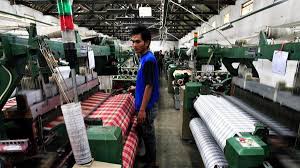
The Textile and Textile Products (TPT) industry is gaining new momentum after the government strengthened its protection measures for the domestic market. Two important policies recently issued by the Ministry of Finance have attracted significant attention from industry players: the implementation of Safeguard Import Duty (BMTP) on imported cotton yarn products through Minister of Finance Regulation (PMK) Number 67 of 2025, and the commitment of Minister of Finance Purbaya Yudhi Sadewa to eradicate illegal used clothing imports, also known as balpres.
Redma Gita Wirawasta, Chairman of the Indonesian Filament Yarn and Fiber Producers Association (APSyFI), believes this new policy can provide a boost to the spinning industry, which currently operates at a utilization rate below 45%. He believes PMK No. 67/2025 has the potential to increase demand by up to 50%, although the effects will not be immediately felt due to the large stock of imported fabrics still on the market. He also emphasized that the cessation of balpres imports will have a significant impact on the recovery of downstream industries, which have been under pressure from the flood of illegal goods.
Redma revealed that illegal imports of used and even new clothing are increasingly rampant, with an estimated 20,000 balls or 300 containers entering Indonesia per month, equivalent to 21 million pieces of clothing. He hopes the government will take decisive action to stop this practice to maintain the sustainability of the domestic industry.
Similar support came from Anne Patricia Sutanto, Head of the Trade Division of the Indonesian Employers' Association (Apindo). She called the crackdown on illegal balpres imports a strategic step to build a healthy domestic market ecosystem. According to Anne, national textile and textile industry players are ready to meet domestic demand as a substitute for the illegal products circulating.
Anne, who also serves as Chairperson of the Indonesian Garment and Textile Association (AGTI), believes that Minister of Finance Regulation No. 67/2025 will help maintain industry liquidity and retain workers. However, she emphasized the importance of policy synchronization between the Ministry of Finance, the Ministry of Trade, and the Ministry of Industry, particularly regarding HS Code regulations, raw material trade regulations, and tax restitution.
She also noted that the textile and textile industry is heavily influenced by global dynamics, from geopolitics to changes in the international supply chain. Therefore, national policies need to be formulated adaptively and based on cross-sectoral data. Anne encouraged the establishment of a common data sharing system between ministries so that every trade and fiscal policy can be implemented flexibly, precisely, and support industrial competitiveness.
In terms of performance, the Ministry of Industry noted that the textile and apparel subsector grew by 5.39% from October 2024 to June 2025. During the same period, investment reached IDR 16.43 trillion with an export value of US$11.19 billion, while the average industrial utilization rate was 65.37%. Minister of Industry Agus Gumiwang Kartasasmita stated that the government continues to strive to balance the industrial and trade balances so that domestic products gain a larger presence in the national market.
However, Redma noted the data. He assessed that the growth figures do not fully reflect the real situation due to the persistence of illegal imports unreported by Customs and Excise. Furthermore, the increase in investment largely represents the realization of machine orders from previous years, not new investment that directly expands production capacity.
A similar view was expressed by Jemmy Kartiwa, Chairman of the Indonesian Textile Association (API). He emphasized that industrial growth is not solely due to increased production, but also due to the accumulation of delayed investment. According to Jemmy, the main challenges that must be overcome are weak purchasing power and protection of the domestic market from the onslaught of cheap imported products.
"If purchasing power is weak, where will industrial production be sold? Protection is also important, because products from other countries that are not absorbed in their markets will flood countries with weak protection," said Jemmy.
Meanwhile, Anne believes the textile and textile industry still has opportunities for positive growth, especially if supported by certainty in labor regulations, logistics efficiency, and lower energy costs. She believes that with the government's commitment to deregulation and synchronization of fiscal and industrial policies, labor-intensive sectors such as textiles and garments can continue to grow and strengthen Indonesia's position in the global market.
The government's new policy is seen as a sign of optimism for the revival of the national textile industry. However, its success will be largely determined by consistent implementation on the ground, synergy between ministries, and concrete support for small and medium-sized industries, the backbone of the sector.
